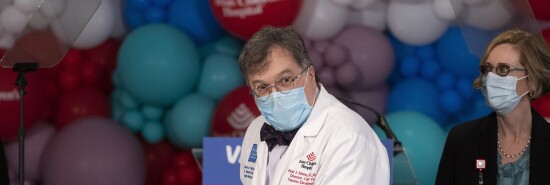
The WHO thinks ‘anti-vaccine activism’ is deadlier than terrorism
Daniel Nuccio
Video Embed
The World Health Organization thinks “anti-vaccine activism” is deadly — so deadly, in fact, that it’s worse than terrorism, gun violence, and the threat of nuclear war.
“We have to recognize that anti-vaccine activism, which I actually call anti-science aggression, has now become a major killing force globally,” declared Dr. Peter Hotez of the Baylor College of Medicine in a video shared on Twitter last month by the WHO.
NEW WHO CHIEF SCIENTIST PRAISED LOCKDOWNS AND CHINA’S COVID POLICIES
“It’s a killing force,” he warned, one deadlier than “gun violence, global terrorism, nuclear proliferation, or cyberattacks.”
“And now it’s become a political movement,” he continued. “In the U.S., it’s linked to far extremism on the far Right. Same in Germany. So this is a new face of anti-science aggression.”
Throughout Hotez’s ominous narration, scary images flash on the screen: spooky skulls, menacing hackers, and angry protesters, interspersed with pictures of people holding signs or sporting masks inscribed with slogans expressing their discontent with COVID-19 restrictions.
The most chilling part of the video, however, comes as Hotez speaks his final line: “And so we need political solutions to address this.”
Before the COVID-19 pandemic, Hotez had a long career studying tropical diseases largely forgotten in the first world. A considerable portion of his research included attempts to develop vaccines against the parasitic organisms responsible for them.
As Hotez discussed in a 2019 interview with Joe Rogan, because he is both a vaccine researcher and the father of an adult daughter with autism, he finds himself in a unique position to speak out against a movement that has attempted to link childhood vaccines to autism based on claims long considered dubious by scientists and medical professionals.
But as COVID-19 began to spread in 2020, Hotez became a frequent guest on MSNBC and CNN, initially discussing the coronavirus in general terms and later becoming a staunch promoter and defender of COVID-19 vaccines.
As the pandemic continued, Hotez also began to attempt to tie opposition to COVID-19 policy not only to previous anti-vaccine activist movements that most people had largely come to dismiss but also to historical examples of belief in medical quackery and contemporary extremist groups of right-wing boogeymen.
Hotez’s message was clear: If you question the effectiveness of masks or are reluctant to get a COVID-19 shot, you’re either a gullible rube or not the kind of person a respectable person would want over for dinner.
More disturbingly, Hotez also began suggesting the need for federal action to curb what he referred to as “anti-science groups.”
In a 2021 article, Hotez pronounced opposition to COVID-19 restrictions as not just a form of anti-science activism but a form of “aggression” perpetrated by congressional Republicans, right-wing news outlets, and conservative intellectuals.
Specific examples cited by Hotez included members of the House suggesting COVID-19 escaped from a lab and calling for audits of Dr. Anthony Fauci’s digital communications, Sen. Ron Johnson (R-WI) publicly highlighting vaccine injuries, and Laura Ingraham calling Hotez bad names on TV.
In a September 2022 commentary published by Nature Reviews Immunology, Hotez wrote of the need to seek “outside advice from experts in homeland security, justice, commerce and even the US State Department,” as well as “the various United Nations agencies” to protect the world from anti-science activists.
Hotez does not offer many specifics for what he wants these agencies to do or what his aforementioned “political solutions” might look like. However, censoring or prosecuting people who commit acts of anti-science aggression would seem like a reasonable assumption. The former has become commonplace on social media, and the latter is a tactic that has been called for by the American Medical Association in efforts to silence critics of doctors providing “gender-affirming” care to children.
Whatever his goals, Hotez’s methodology is now easy for him to justify: When you label any form of disagreement or skepticism as “aggression,” it’s suddenly reasonable to ask the strong arm of government to intervene.
CLICK HERE TO READ MORE FROM THE WASHINGTON EXAMINER
Daniel Nuccio is a Ph.D. student in biology and a regular contributor to the College Fix and the Brownstone Institute.
